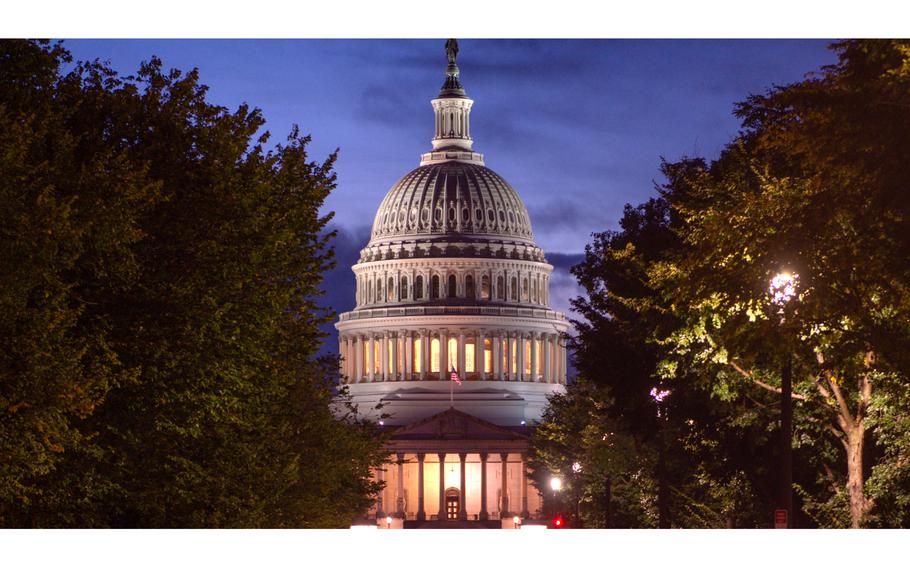U.S.
Congress releases 6 funding bills ahead of Friday shutdown deadline
The Washington Post March 3, 2024

Congressional appropriators on Sunday, March 3, 2024, released half a dozen bills that, if passed this week, would keep six agencies — about 40% of the government — funded for the rest of the fiscal year after months of turmoil and blockades led by conservative Republicans seeking severe cuts to federal spending. (Carlos Bongioanni/Stars and Stripes)
Congressional appropriators on Sunday released half a dozen bills that, if passed this week, would keep six agencies — about 40% of the government — funded for the rest of the fiscal year after months of turmoil and blockades led by conservative Republicans seeking severe cuts to federal spending.
The package totals $704 billion, a better-late-than-never agreement reached among congressional leaders after months of delays, negotiations and stopgap measures that took the government to the brink of a shutdown multiple times since the fiscal year began on Oct. 1.
The House must pass the measure first and the Senate will follow. Legislative action must be complete before the March 8 funding deadline that was set late last week to avoid a partial government shutdown. The legislation funds several agencies, including the Departments of Transportation, Veterans Affairs, Energy, Agriculture, Interior, and Housing and Urban Development, as well as the Environmental Protection Agency and the Food and Drug Administration.
Congress still faces a March 22 deadline to secure funding for the rest of the government.
In a statement Sunday, Senate Majority Leader Charles E. Schumer (D-N.Y.) touted the package and urged quick action on it in the House, promising to bring it to the Senate floor as soon as it passes the lower chamber to avoid a partial shutdown.
A member of House Republican leadership, who spoke on the condition of anonymity to comment freely about the funding package, said that lawmakers are “still in the midst of significant negotiations in the second package.”
The six bills’ total is $40 billion less than what was allocated for the same departments during the last fiscal year, Republicans noted. They touted the funding package as a victory by arguing that it is not a sprawling omnibus but rather a “robust” six-bill package that was developed over time with “more member engagement.”
“We were saying, ‘No omnibus,’” the Republican said, using the term used for one massive bill to fund the entire government. “The Senate was not going to get away with not doing anything and then just, you know, posting their bills online and having a negotiation from there.” Instead, Congress plans to use two packages to pass funding for the entire government.
House Republicans touted provisions in the bill that will cut spending to the Environmental Protection Agency, the Federal Bureau of Investigation, and the Bureau of Alcohol, Tobacco, Firearms and Explosives.
The package increases funds to the Drug Enforcement Administration, securing additional money for efforts to combat the trade of fentanyl. Additionally, the package fully funds veterans’ health care and benefits.
Democratic leadership welcomed the six measures on Sunday.
Rep. Rosa DeLauro (D-Conn.), the top Democrat in the House Appropriations Committee, said in a statement Sunday that she was “pleased” to see Democrats and Republicans in the House and Senate work to produce bipartisan measures that will keep the government open.
“I am grateful that each of these bills rejects many of the extreme cuts and policies proposed by House Republicans and protects the great strides we made over the last two years to reverse the underinvestment in domestic programs that Americans depend on,” DeLauro said. “I urge swift passage of this package and look forward to releasing the remaining 2024 funding bills.”
Appropriations leaders on both parties also emphasized the bipartisan nature of the bills. Sen. Patty Murray (D-Wash.) said in a statement Sunday that the package “was a negotiation” and that “Democrats worked under really tough fiscal constraints that I never agreed with, but for months, I’ve made clear we can in fact fund our government if we just work together in a reasonable, bipartisan way.”
Sen. Susan Collins (R-Maine), the top Republican in the Senate Appropriations Committee, said in a statement that members of the committee “in both chambers have worked very hard to reach agreements on the bill text unveiled today.”
“I look forward to working with Chair Murray and our colleagues to bring this legislation to the Senate floor for a vote without any further delay,” she said.
Leigh Ann Caldwell and Daniel Gilbert contributed to this report.